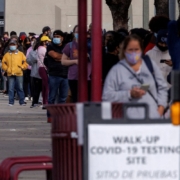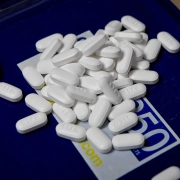Ferrero on April 12 asked U.S. consumers to dispose of some Kinder chocolate products not authorized for distribution in the country, warning they could be from the batch recently recalled in Europe due to a potential Salmonella Typhimurium contamination.
The BA.2 Omicron subvariant of the coronavirus is responsible for 86% of U.S. COVID-19 cases and more than 90% of infections in the Northeast, according to data on April 12 from the U.S. Centers for Disease Control and Prevention (CDC).
Philadelphia will again require masks in indoor public settings such as restaurants, schools and businesses starting next week, the city said on April 11, responding to what appears to be a fresh wave of coronavirus transmissions.
Walgreens Boots Alliance Inc. supplied billions of opioid pills to drug addicts and criminals, contributing to an addiction epidemic in Florida, a lawyer for the state said on April 11 as a civil trial against the pharmacy chain got underway.
Biden launches U.S. plan to help Americans struggling with long COVID
“Long-Haul” COVID-19, Coronavirus Disease 2019 (COVID-19), Department of Health and Human Services (HHS), Healthcare Policy, Joe Biden, Long COVID, Physicians, Policy, Primary Care, Primary Care Physicians (PCPs), Therapeutics, U.S. Centers for Disease Control and Prevention, U.S. Department of Veterans Affairs, United StatesPresident Joe Biden on April 5 tasked the U.S. health department with developing a national action plan to tackle the looming health crisis of long COVID, a complex, multi-symptom condition that leaves many of its sufferers unable to work.
Negotiators in Congress agreed to an additional $10 billion in COVID-19 funding to address U.S. needs but have dropped international aid from the package, Senate Majority Leader Chuck Schumer said on April 4.
The U.S. national public health agency said on April 4 the BA.2 sub-variant of Omicron was estimated to account for nearly three of every four coronavirus variants in the country.
West Virginia Says J&J, Drugmakers Created ‘Tsunami’ of Opioid Addiction
AbbVie, Addictions, Allergan, Business, Class Action Lawsuits, Johnson & Johnson, Lawsuits, Lawsuits, Opioid Lawsuits, Opioid Overdoses, Opioids, Opioids, Opioids, Opioids, Overdoses, Painkillers, Public Health Crisis, Settlements, Teva, Therapeutics, West VirginiaWest Virginia’s attorney general on April 4 urged a judge to hold Johnson & Johnson, Teva Pharmaceutical Industries Ltd., and AbbVie Inc.’s Allergen liable for causing a “tsunami” of opioid addiction in the state.
France is facing its worst bird flu crisis in history as a rare rebound in outbreaks of the highly contagious virus reached the country’s largest poultry producing regions with cullings topping more than 12 million birds.
Bayer said the German drugmaker would invest around 2 billion euros ($2.23 billion) at pharmaceutical manufacturing sites over the next three years, mainly to bolster production of biotechnology products as well as cell and gene therapies.


 Reuters/Andrew Kelly
Reuters/Andrew Kelly
 Reuters
Reuters


 Reuters Health
Reuters Health
